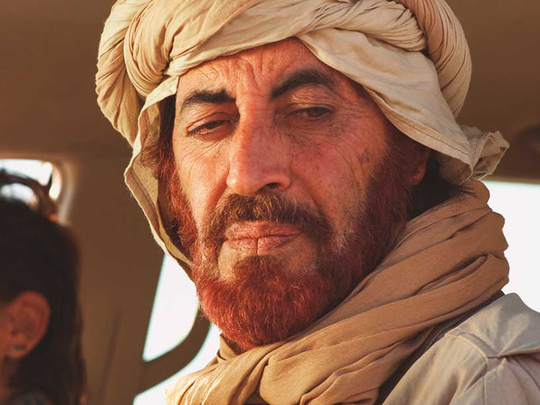
Tunisian filmmaker Nacer Khemir attended the screening of his film, Whispering Sands, at the Madinat Theatre on December 10 at the ongoing Dubai International Film Festival (Diff), accompanied by actress, Noura Saladin, who plays the character of Antoine in the movie.
The film is a study of the history of Arab culture and traditions, and the bleak future that culture erosion is likely to cause. In the process of writing the story, Khemir, reflected on modern Arab society and worries about the actions, and choices of current and future generations.
“There’s a problem with a sense of loss in the Arab world, and it’s [also] a loss of humanity,” he said. “It’s a good thing we’re here, and we’re able to show such a film in Dubai.”
Whispering Sands possesses a poetic quality in its cinematography, and its narrative. It evokes a tremendous amount of emotions, ranging from grief and suffering, to an uneasy fearfulness of what the future holds. The temporal nature of this film, and the use of flashbacks, which resembles Ingmar Bergman’s Wild Strawberries (1957), is implemented just as well.
The movie further delves into themes of Sufism and mysticism that flourish throughout, and is most evident in the character development of Antoine. As the movie progresses, she begins to learn and appreciate the stories told. There is a compelling dichotomy between the local Bedouin guide and the Canadian Antoine as they eventually share their experiences, stories of their heritage, and their understanding of Arab culture.
The film is magnificently shot, most notably the scenes that take place during sunset and at night in the desert. The sequence which draws parallels between a lone bird in the sky, Antoine in the desert, and a lone boat at sea, is yet another example of the elegiac facet of the film.
At the post-screening Q&A, Khemir shared his aversion towards the representation of Arabs in the media, and how that inspired him to make this film. He also mentioned that during the making of the movie, he was very particular about the accents in the film, and that he wanted the Tunisian-origin guide to speak with a Bedouin accent.
“This mixture of accents, and dialects has contributed to the success of the film, and is a reflection of the Arabic language,” he added.
The session closed on a triumphant note, with the guarantee that each viewer would leave augmented from this voyage in time.
— The Young Journalist Award (YJA) at Diff is a training programme for high school and university students who are aspiring writers and reporters. Seven students are competing at the festival this year. One winner will secure a monthlong internship with Gulf News.










